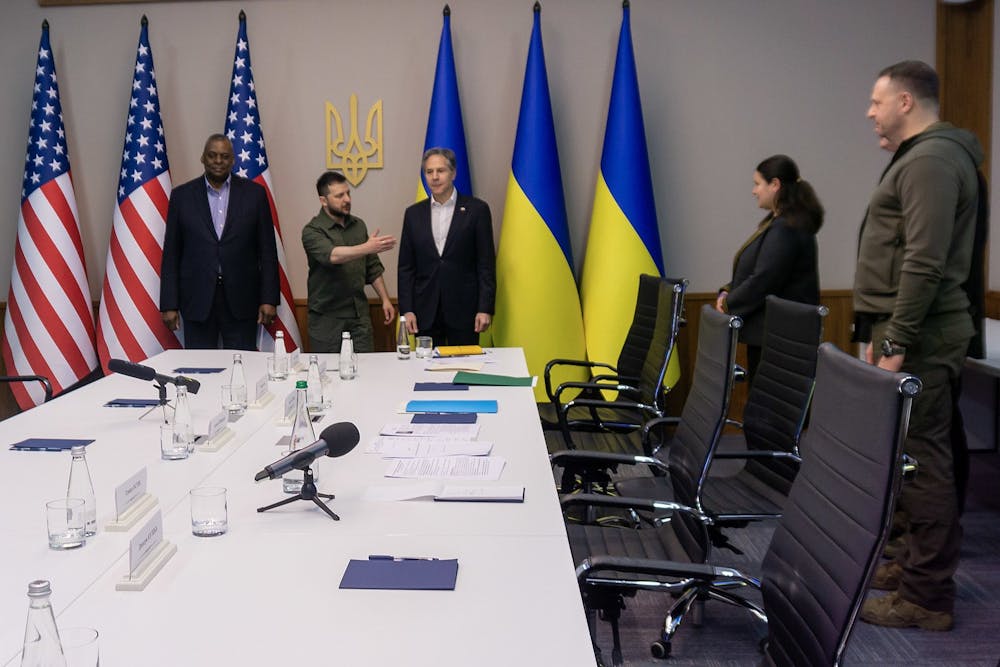By Ailya Khan
Staff Writer
United States Secretary of State, Antony Blinken, surprised the international political world with his unannounced visit to Ukraine in the thick of intense war conditions. He arrived in Kyiv on Sept. 6 to meet with senior Ukrainian officials and convey unwavering American support for Ukrainian independence, democracy and resiliency in the face of Russian aggression, according to the U.S Department of State.
The primary grounds behind this visit was to discuss Ukraine’s current counteroffensive, a plan in which military forces are attempting to gradually recapture and secure lost Ukrainian territory. According to the Wall Street Journal, Ukrainian troops are discreetly entering the line of Russian captured areas in small numbers, to open gaps for troops with heavier equipment to follow later on. The idea is to cautiously breach the region from all directions and create secure strongholds for a long-term advantage, rather than execute a big attack immediately, which will be easy for Russia to respond to with force.
Blinken made it a priority during his visit to highlight substantial progress of the Ukrainian counteroffensive as well as to reiterate full U.S. support for Ukraine’s efforts. This backing from Blinken is pivotal for Ukraine in the eyes of valuable allies amid recent negative media reports regarding the counteroffensive, claiming it to be “slow and hindered by poor tactics,’’ according to NBC.
Ukraine's advances into their invaded territories have been unfortunately impeded by geographical obstacles such as minefields and trenches, as well as constant powerful attacks from Russia, according to NBC. Deadly airstrikes across Ukraine have continued, slowing down the progress of the counteroffensive and destroying civilian communities, which consequently has resulted in the loss of many innocent lives.
Just hours before Blinken’s arrival in Kyiv, an outdoor market in eastern Ukraine, busy with civilians going about their lives, was engulfed in flames after being struck by a Russian missile. According to AP, the strike occurred in a town called Kostiantynivka and killed 17 people and injured at least 32.
The once peaceful civilian neighborhood was left as a mess of charred bodies, destroyed buildings and burning clothes and cars. First responders devoted themselves to tending to the wounded and putting out the flames. This attack was purely intentional on Russia’s part: an attempt to induce more suffering and damage by striking an entirely civilian population with no military basis.
Despite the devastating circumstances, Ukraine’s counteroffensive has notably made significant progress in fighting Russian assaults and acquiring back territory in the past few days with its recent push into the southeast. According to ABC, Blinken also proclaimed during his visit that he is seeing progress with the mission and is optimistic, as the nation has recaptured around 50% of its lost territory since the beginning of the war. Blinken’s affirmation of Ukraine’s successes helped to increase morale regarding the counteroffensive and encouraged publicity towards increased funding for Ukraine’s war and recovery needs.
During Blinken’s visit, he also pledged more than $1 billion in U.S. funding for Ukraine in order to help assess military and national recovery needs. Blinken also expressed on behalf of the Biden administration and the Pentagon that they would try to supply U.S. financial aid for Ukraine for as long as it takes. Continued financial support from the U.S. is critical for Ukraine, according to the Wall Street Journal, as President Vladimir Putin has expressed his commitment to winning the war at any cost.
The aid package announced by Blinken will come from the Pentagon through the Ukraine Security Assistance Initiative. According to AP, the package is set to contain $175 million for military aid in weapons, including depleted-uranium munitions. An additional $100 million in grants will be given to purchase other arms and necessities. Furthermore, nearly $805 million will be provided for non-arms related assistance. This entails $300 million for law enforcement, $206 million in humanitarian aid, $203 million for corruption and $90.5 million towards removing mines. President Biden has supposedly requested another $21 billion in aid from Congress, but it is unknown what can be approved from this proposal.
There is current hesitation and doubt surrounding the topic of financial aid from the U.S. after the upcoming 2024 election. A growing number of Republicans hold opinions against increased funding for foreign affairs. The potential outcome of the nearing election may or may not present additional struggles for Ukraine. The U.S.'s European allies are also relying on U.S. support for Ukraine to win against Russia, in hopes that they will not be left to take on responsibility for Ukrainian defenses without Washington's support, according to the Wall Street Journal.
The U.S. government under the Biden administration currently devotes itself strongly to providing continuous financial aid for Ukraine during this war for as long as necessary. The true price of this war displays itself not through money, but through each and every innocent Ukrainian life lost due to Russia’s agenda and targeted civilian attacks.







